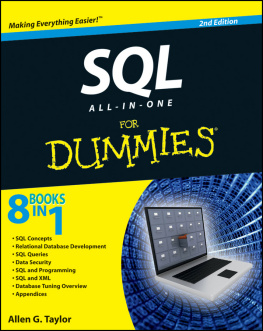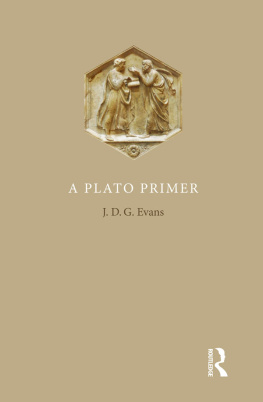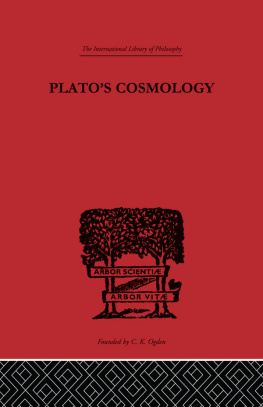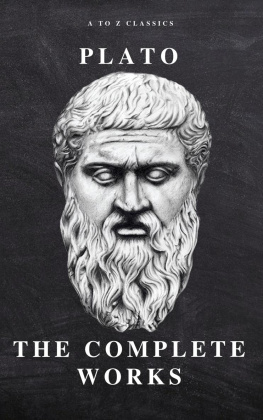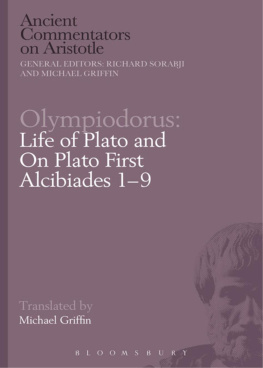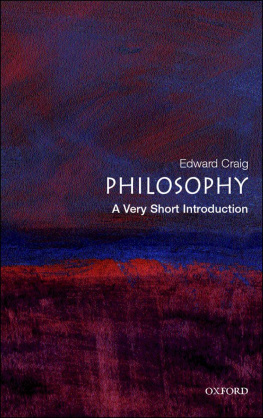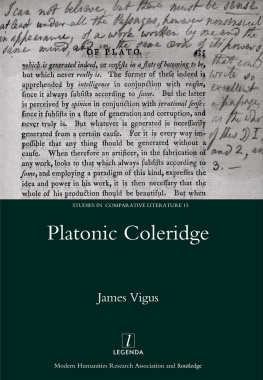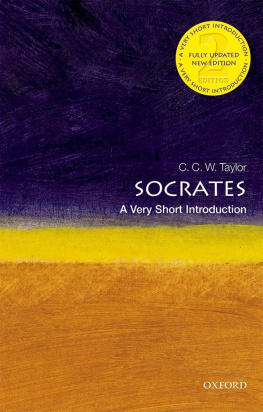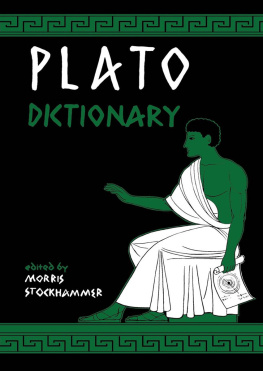Taylor - Introduction to the philosophy and writings of Plato
Here you can read online Taylor - Introduction to the philosophy and writings of Plato full text of the book (entire story) in english for free. Download pdf and epub, get meaning, cover and reviews about this ebook. genre: Science. Description of the work, (preface) as well as reviews are available. Best literature library LitArk.com created for fans of good reading and offers a wide selection of genres:
Romance novel
Science fiction
Adventure
Detective
Science
History
Home and family
Prose
Art
Politics
Computer
Non-fiction
Religion
Business
Children
Humor
Choose a favorite category and find really read worthwhile books. Enjoy immersion in the world of imagination, feel the emotions of the characters or learn something new for yourself, make an fascinating discovery.
Introduction to the philosophy and writings of Plato: summary, description and annotation
We offer to read an annotation, description, summary or preface (depends on what the author of the book "Introduction to the philosophy and writings of Plato" wrote himself). If you haven't found the necessary information about the book — write in the comments, we will try to find it.
Taylor: author's other books
Who wrote Introduction to the philosophy and writings of Plato? Find out the surname, the name of the author of the book and a list of all author's works by series.
Introduction to the philosophy and writings of Plato — read online for free the complete book (whole text) full work
Below is the text of the book, divided by pages. System saving the place of the last page read, allows you to conveniently read the book "Introduction to the philosophy and writings of Plato" online for free, without having to search again every time where you left off. Put a bookmark, and you can go to the page where you finished reading at any time.
Font size:
Interval:
Bookmark:
The Project Gutenberg EBook of Introduction to the Philosophy and Writingsof Plato, by Thomas Taylor
This eBook is for the use of anyone anywhere at no cost and withalmost no restrictions whatsoever. You may copy it, give it away orre-use it under the terms of the Project Gutenberg License includedwith this eBook or online at www.gutenberg.net
Title: Introduction to the Philosophy and Writings of Plato
Author: Thomas Taylor
Release Date: November 22, 2003 [EBook #10214]
Language: English
Character set encoding: ISO Latin-1
*** START OF THIS PROJECT GUTENBERG EBOOK INTRODUCTION TO THE ***
Produced by Jake Jaqua
By
"Philosophy," says Hierocles, "is the purification and perfection of humanlife. It is the purification, indeed, from material irrationality, and themortal body; but the perfection, in consequence of being the resumption ofour proper felicity, and a reascent to the divine likeness. To effect thesetwo is the province of Virtue and Truth; the former exterminating theimmoderation of the passions; and the latter introducing the divine form tothose who are naturally adapted to its reception."
Of philosophy thus defined, which may be compared to a luminous pyramid,terminating in Deity, and having for its basis the rational soul of manand its spontaneous unperverted conceptions,of this philosophy, August,magnificent, and divine, Plato may be justly called the primary leaderand hierophant, through whom, like the mystic light in the inmostrecesses of some sacred temple, it first shone forth with occult andvenerable splendour.[1] It may indeed be truly said of the whole of thisphilosophy, that it is the greatest good which man can participate: forif it purifies us from the defilements of the passions and assimilates usto Divinity, it confers on us the proper felicity of our nature. Hence itis easy to collect its pre-eminence to all other philosophies; to showthat where they oppose it, they are erroneous; that so far as theycontain any thing scientific they are allied to it; and that at best theyare but rivulets derived from this vast ocean of truth.
[1] In the mysteries a light of this kind shone forth from the adytum ofthe temple in which they were exhibited.
To evince that the philosophy of Plato possesses this preeminence; thatits dignity and sublimity are unrivaled; that it is the parent of allthat ennobles man; and, that it is founded on principles, which neithertime can obliterate, nor sophistry subvert, is the principal design ofthis Introduction.
To effect this design, I shall in the first place present the reader withthe outlines of the principal dogmas of Plato's philosophy. The undertakingis indeed no less novel than arduous, since the author of it has to treadin paths which have been untrodden for upwards of a thousand years, andto bring to light truths which for that extended period have beenconcealed in Greek. Let not the reader, therefore, be surprised at thesolitariness of the paths through which I shall attempt to conduct him,or at the novelty of the objects which will present themselves in thejourney: for perhaps he may fortunately recollect that he has traveledthe same road before, that the scenes were once familiar to him, and thatthe country through which he is passing is his native land. At, least, ifhis sight should be dim, and his memory oblivious, (for the objects whichhe will meet with can only be seen by the most piercing eyes,) and hisabsence from them has been lamentably long, let him implore the powerof wisdom,
From mortal mists to purify his eyes,
That God and man he may distinctly see.
Let us also, imploring the assistance of the same illuminating power, beginthe solitary journey.
Of all the dogmas of Plato, that concerning the first principle of thingsas far transcends in sublimity the doctrine of other philosophers of adifferent sect, on this subject, as this supreme cause of all transcendsother causes. For, according to Plato, the highest God, whom in theRepublic he calls the good, and in the Parmenides the one, is not onlyabove soul and intellect, but is even superior to being itself. Hence,since every thing which can in any respect be known, or of which anything can be asserted, must be connected with the universality of things,but the first cause is above all things, it is very properly said byPlato to be perfectly ineffable. The first hypothesis therefore of his,Parmenides, in which all things are denied of this immense principle,concludes as follows: "The one therefore is in no respect. So it seems.Hence it is not in such a manner as to be one, for thus it would bebeing, and participate of essence; but as it appears, the one neither isone, nor is, if it be proper to believe in reasoning of this kind. Itappears so. But can any thing either belong to, or be affirmed of that,which is not? How can it? Neither therefore does any name belong to it,nor discourse, nor any science, nor sense, nor opinion. It does notappear that there can. Hence it can neither be named, nor spoken of, norconceived by opinion, nor be known, nor perceived by any being. So itseems." And here it must be observed that this conclusion respecting thehighest principle of things, that he is perfectly ineffable andinconceivable, is the result of a most scientific series of negations, inwhich not only all sensible and intellectual beings are denied of him,but even natures the most transcendently allied to him, his first andmost divine progeny. For that which so eminently distinguishes thephilosophy of Plato from others is this, that every part of it is stampedwith the character of science. The vulgar indeed proclaim the Deity to beineffable; but as they have no scientific knowledge that he is so, thisis nothing more than a confused and indistinct perception of the mostsublime of all truths, like that of a thing seen between sleeping andwaking, like Phaeacia to Ulysses when sailing to his native land,
That lay before him indistinct and vast,
Like a broad shield amid the watr'y waste.
In short, an unscientific perception of the ineffable nature of theDivinity resembles that of a man, who on surveying the heavens, shouldassert of the altitude of its highest part, that it surpasses that ofthe loftiest tree, and is therefore immeasurable. But to see thisscientifically, is like a survey of this highest part of the heavens bythe astronomer; for he by knowing the height of the media between us andit, knows also scientifically that it transcends in altitude not only theloftiest tree; but the summits of air and aether, the moon, and even thesun itself.
Let us therefore investigate what is the ascent to the ineffably, andafter what manner it is accomplished, according to Plato, from the lastof things, following the profound and most inquisitive Damascius as ourleader in this arduous investigation. Let our discourse also be commonto other principles, and to things proceeding from them to that which islast, and let us, beginning from that which is perfectly effable andknown to sense, ascend too the ineffable, and establish in silence, as ina port, the parturitions of truth concerning it. Let us then assume thefollowing axiom, in which as in a secure vehicle we may safely pass fromhence thither. I say, therefore, that the unindigent is naturally priorto the indigent. For that which is in want of another is naturallyadapted from necessity to be subservient to that of which it is indigent.But if they are mutually in want of each other, each being indigent ofthe other in a different respect, neither of them will be the principle.For the unindigent is most adapted to that which is truly the principle.And if it is in want of any thing, according to this it will not be theprinciple. It is however necessary that the principles should be thisvery thing, the principle alone. The unindigent therefore pertains tothis, nor must it by any means be acknowledged that there is any thingprior to it. This however, would be acknowledged if it had any connectionwith the indigent.
Next pageFont size:
Interval:
Bookmark:
Similar books «Introduction to the philosophy and writings of Plato»
Look at similar books to Introduction to the philosophy and writings of Plato. We have selected literature similar in name and meaning in the hope of providing readers with more options to find new, interesting, not yet read works.
Discussion, reviews of the book Introduction to the philosophy and writings of Plato and just readers' own opinions. Leave your comments, write what you think about the work, its meaning or the main characters. Specify what exactly you liked and what you didn't like, and why you think so.





